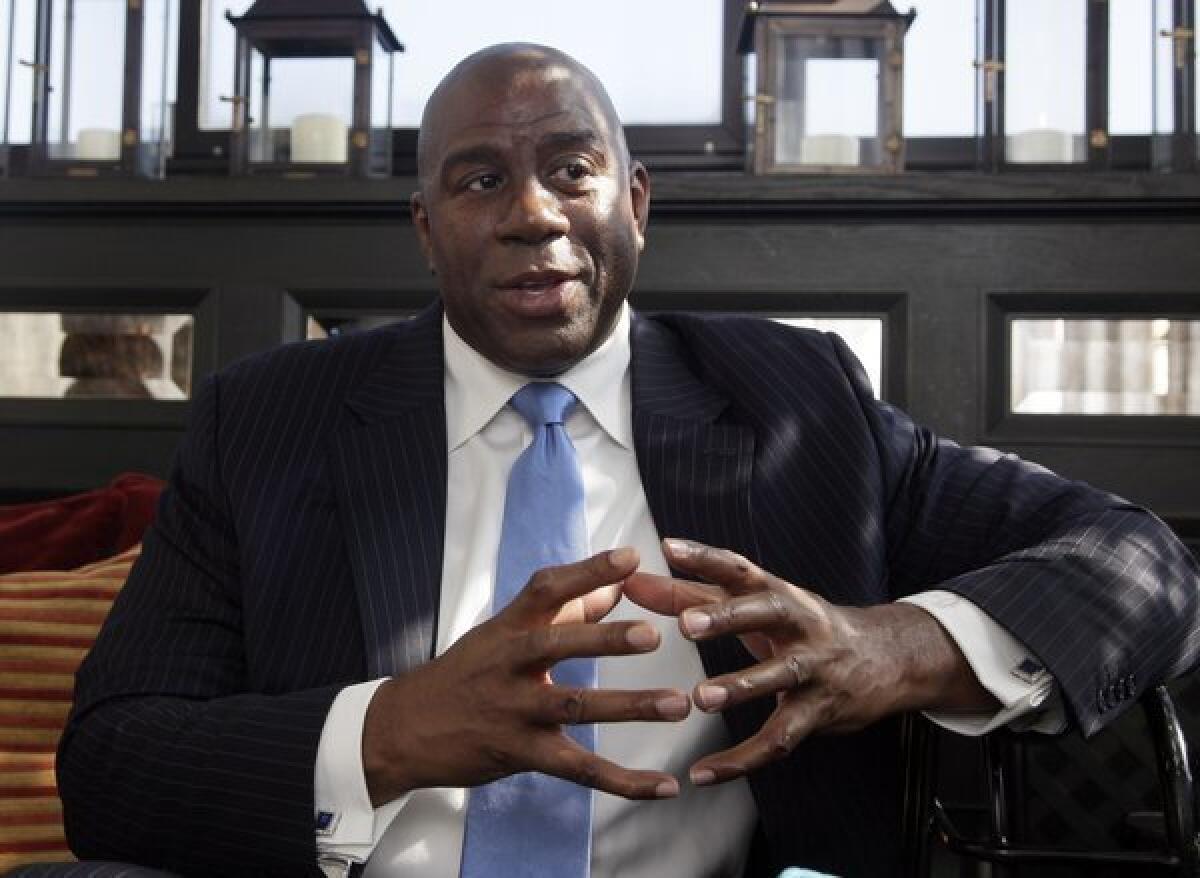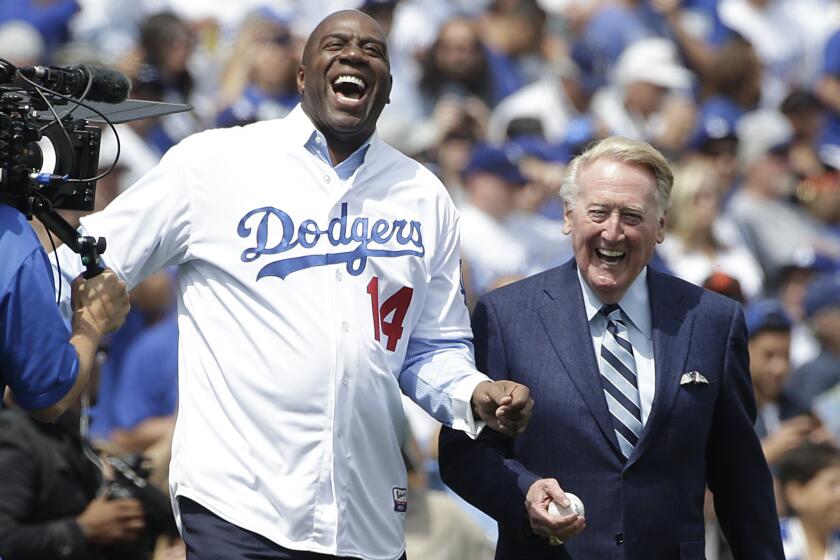With $100 million, Magic Johnson pays it forward

- Share via
Magic Johnson, janitor.
Before we talk about the $100 million in loans his insurance company is funding for minority- and women-owned businesses, we first need to talk about the 16-year-old kid cleaning toilets in a Michigan office building. The intellectually curious and ambitious teen would sneak into the executive offices, take a seat in a reclining chair and kick up his feet on the desk, pretending to give orders to an imaginary assistant.
“That’s when my dreams went from not only being in the NBA to also wanting to run my own business,” he said in an interview with the Los Angeles Times on Tuesday. “I’ve always said, ‘If you don’t dream it, you can’t become it.’ That early experience working for black business owners showed me what was possible. It’s why I have my business.”
Far too often, the conversations around diversity and inclusion get oversimplified. Seeing someone who looks like you occupy a particular space always has meant more than checking an affirmative action box on an HR worksheet. It is about a shared experience, or perhaps a worldview being represented in the country’s kaleidoscope. It is about letting minorities know you don’t just sing America, you are America, and your contributions are necessary for her success.
It’s Magic Johnson versus Vin Scully in the finals of the Los Angeles Times’ tournament to determine L.A.’s biggest sports icon.
“In my era, I didn’t see any blacks in business,” said Joel Ferguson, who along with fellow businessman Gregory Eaton employed and mentored Johnson before he was Magic. ”It’s very important that there are role models, to have people who are where you want to be.
“But having role models isn’t enough. You also have to be a hard worker. [Johnson] was really good at doing all of the things we asked of him. And he asked a lot of good, relevant questions about what it takes to be a successful businessman.”
Johnson credits his start of cleaning office buildings as the primary reason why, upon hearing minority-owned businesses were struggling to receive the necessary assistance during the coronavirus pandemic, he put together a plan to help.
“If they close down because of lack of funding, it would create a lot of jobless black and brown people, and it would eliminate access to the resources the community needs,” Johnson said. “We then would need to go outside of our community for our goods and services, and that not only puts a strain on people, it could hurt the property value.”
This is how the plan works: EquiTrust Life Insurance Co., which Johnson owns, will distribute the loans through the Small Business Administration’s federal Paycheck Protection Program in partnership with MBE Capital Partners, a New Jersey-based nonbank lender that works closely with minority-owned businesses. In general, if companies retain their workforces, PPP loans can function more like grants, backed by the SBA. Johnson’s funding will reportedly go toward some 5,000 loans that have already been approved. Recipients of the loans will gain access to capital that they’ve been unable to secure from major banks and credit unions.
At the onset of the shutdown, the Center for Responsible Lending projected that more than 90% of businesses owned by blacks, Latinos and Native Hawaiians or Pacific Islanders were unlikely to secure a PPP loan through a major bank or credit union. For Asian Americans, it was 75%.
‘Never fear, Magic is here’: On May 16, 1980, with the Cap sidelined with an ankle injury, Magic Johnson launched a decade of Lakers ‘Showtime’ dominance.
These businesses have watched the SBA distribute hundreds of millions of dollars to companies with much better access to capital markets — and far less need. One of those businesses? The franchise with which Johnson is most closely identified, the Lakers. Last month, the team received a $4.6-million distribution before returning it amid public backlash. We all are clamoring to return to normal, but if a community’s restaurants, salons, accountants and churches continue to be ignored in the most dire of times, that’s not what normal should be.
It is, in fact, a reminder of how COVID-19, which has already taken minority lives at a disproportionate level, has ravaged a community.
“We know those places where everybody is on a first-name basis, where your mom, dad, uncle or sister works there, and that makes us all feel good and is a source of pride,” said Johnson, who not only stays in touch with his earliest mentors but partners in business deals with them as well. “The places that allow minority kids to dream. Just like for me back in Lansing, [Ferguson and Eaton] owning businesses and giving me an opportunity is really why I’m blessed to be able to help people today. That’s how this thing works.”
More to Read
Go beyond the scoreboard
Get the latest on L.A.'s teams in the daily Sports Report newsletter.
You may occasionally receive promotional content from the Los Angeles Times.












